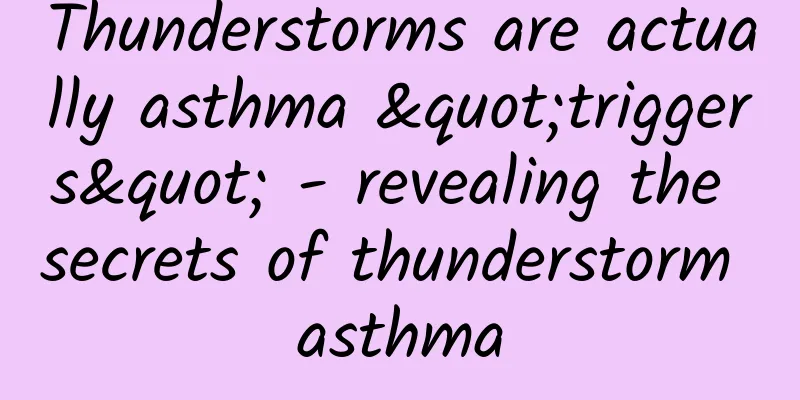Thunderstorms are actually asthma "triggers" - revealing the secrets of thunderstorm asthma

|
Author: Jia Dayi Inner Mongolia Autonomous Region Maternal and Child Health Hospital Ma Yan Inner Mongolia Autonomous Region Maternal and Child Health Hospital Wang Huanfang Inner Mongolia Autonomous Region Maternal and Child Health Hospital Reviewer: Hou Hui, Chief Physician, People's Hospital of Inner Mongolia Autonomous Region, Doctor of Medicine Figure 1 Copyright image, no permission to reprint In September 2023, in Hohhot, Inner Mongolia, thunder roared and heavy rain followed, followed by patients filling the emergency departments of many hospitals. They were diagnosed with "thunderstorm asthma." ※What is thunderstorm asthma? What causes thunderstorm asthma? Thunderstorm asthma, also known as thunderstorm-induced asthma, is a symptom of asthma caused by frequent thunderstorms. The disease was first reported in the UK in 1983, and has since been recorded in many countries and regions around the world. With the acceleration of industrialization and urbanization, pollutants in the atmosphere have gradually increased. These pollutants may interact with allergens in thunderstorms and increase the risk of asthma attacks. At the same time, climate change has led to frequent thunderstorms, providing meteorological conditions for the occurrence of thunderstorm asthma. The occurrence of thunderstorm asthma is related to meteorological conditions, allergens and individual factors during thunderstorms. During thunderstorms, allergen particles such as pollen and mold spores in the atmosphere are washed and dispersed to the ground by wind and rain, forming a high-concentration allergen environment. At the same time, the electric field changes caused by lightning activity make these allergen molecules smaller and easier to penetrate the respiratory mucosa, thereby inducing and aggravating asthma symptoms. In addition, individual allergic constitution and airway hyperreactivity are also important factors leading to thunderstorm asthma. ※Symptoms and diagnosis of thunderstorm asthma Thunderstorm asthma is a special type of bronchial asthma, with typical symptoms including dyspnea, cough, chest tightness, shortness of breath, etc., which can be life-threatening in severe cases. These symptoms usually appear or worsen during thunderstorms, because the wind will lift allergens such as pollen and mold, and after lightning strikes, these allergens are broken into smaller particles, which are easier to be inhaled by the human body, thus aggravating or triggering asthma symptoms. Thunderstorm asthma attacks may also be accompanied by symptoms such as shortness of breath, sneezing, and runny nose. These symptoms occur mainly because allergens stimulate the increased secretions in the respiratory tract, which irritate the respiratory mucosa. At the same time, the sudden change in atmospheric pressure, rapid fluctuations in temperature and humidity, and increased particulate matter and allergens in the air caused by thunderstorms act together on the patient's respiratory system, which may further aggravate breathing difficulties. Figure 2 Copyright image, no permission to reprint When diagnosing thunderstorm asthma, doctors usually make a comprehensive judgment based on the patient's medical history, symptoms, and allergen test results. For asthma patients, if the symptoms are significantly aggravated during the thunderstorm season, the possibility of thunderstorm asthma should be highly suspected. ※Prevention of thunderstorm asthma ——Pay attention to weather forecasts, especially warnings of thunderstorms. Before thunderstorms arrive, try to avoid going out as much as possible to avoid exposure to high concentrations of allergens. If you must go out, it is recommended to wear a mask, goggles, and a hat to reduce the risk of inhaling and contaminating allergens. Figure 3 Copyright image, no permission to reprint ——Keep the indoor air fresh and clean the air conditioning filter and indoor environment regularly to reduce the breeding of allergens. Use equipment such as air purifiers to improve indoor air quality. ——For asthma patients, they should follow the doctor's advice to use asthma treatment drugs to control symptoms and reduce the risk of asthma attacks. At the same time, they should regularly conduct allergen tests to understand their allergies so as to better avoid contact with allergens. - Strengthening physical exercise and improving body resistance can help prevent the onset of thunderstorm asthma. However, it should be noted that outdoor exercise should be avoided during thunderstorms to avoid triggering asthma symptoms. Treatment of thunderstorm asthma The treatment strategy for thunderstorm asthma usually includes rapid relief treatment during the acute attack period and long-term control treatment. ——During the acute attack period, the first priority is to relieve airflow limitation as quickly as possible, reduce airway hyperresponsiveness, improve hypoxia, and prevent complications. Commonly used rapid relief drugs include short-acting β2 receptor agonists (such as salbutamol, terbutaline, etc.) and inhaled glucocorticoids (such as budesonide, etc.). These drugs can act quickly on the respiratory tract through inhalation and relieve asthma symptoms. ——Long-term control therapy aims to reduce airway inflammation and reduce the frequency and severity of asthma attacks. Commonly used drugs include inhaled corticosteroids, leukotriene modifiers, long-acting β2 receptor agonists, etc. Patients need to take medication according to the doctor's advice and undergo regular review and evaluation. It should be noted that the specific conditions of each patient are different, so the treatment plan should be formulated according to the patient's specific conditions and the doctor's advice. At the same time, patients should maintain good living habits and mentality, and actively cooperate with treatment in order to achieve better treatment results. Figure 4 Copyright image, no permission to reprint By understanding the causes, symptoms, and diagnosis of thunderstorm asthma, as well as prevention and treatment measures, we can better protect the health of ourselves and our families. Let us work together to create a healthier and safer living environment. |
<<: Lung cancer screening keeps you away from the "silent killer"
>>: Can I still exercise if I’m out of breath?
Recommend
What disease may be caused by pus-like leucorrhea?
Many patients will find that their leucorrhea is ...
What causes breast hyperplasia?
The disease of breast hyperplasia has obvious age...
Don’t ignore the safety of your fingertips during the Spring Festival! There are risks when using nail lamps!
The Spring Festival is coming. In order to celebr...
What are the fitness plans for girls to lose fat and gain muscle?
For many women today, losing body fat is not just...
Standard size of gestational sac at 11 weeks of pregnancy
During pregnancy, the body of a pregnant woman is...
Beware! Taking cold medicines together may pose a big risk
Recently, respiratory diseases have become preval...
Why does the seven-leaf lotus lose its leaves? Can the seven-leaf lotus survive if all its leaves fall off?
Seven-leaf lotus is a common flower plant in Chin...
What are the causes of candidal vaginitis?
Many women are troubled by abnormal leucorrhea, a...
How serious is the "second-degree minor injury" of the Tangshan girl?
On June 21, the Hebei Provincial Public Security ...
[Medical Q&A] Do all examinations in the radiology department involve radiation?
Planner: Chinese Medical Association Reviewer: Ko...
Why should you seek medical attention as soon as possible if you have a headache or vomiting?
Author: Chen Haibo, chief physician of Beijing Ho...
Can I rub my belly after a cesarean section?
In order to avoid the pain of childbirth, more an...
Four months pregnant belly picture
In the fourth month of pregnancy, the growth of t...
Implantation occurs on the first day after ovulation
Women usually ovulate around the 14th day from th...
How to quit your job immediately when you are pregnant
Many women cannot work normally during pregnancy ...









